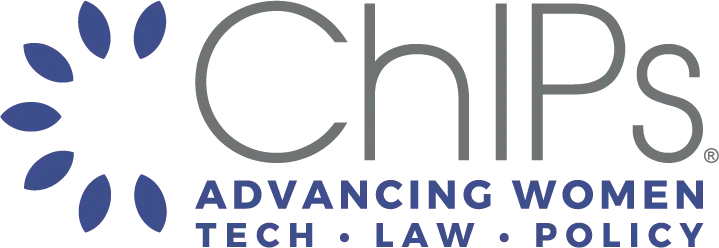On March Friday, March 31, 2017, the East Coast Chapter of ChIPs presented “Haute Tech 2: A Conversation with Innovators” at Kirkland & Ellis in New York City.
The panel included fashion entrepreneurs and legal professionals (listed below), and was organized by ChIPs East Coast Co-Chair, Kathi Cover and Karin Norton, who also moderated.
- Deborah McNamara, adjunct professor of Fashion Law at New York Law School
- Veronika Harbick, cofounder at Thursday Finest
- Ava Farshidi, associate counsel at Rebecca Minkoff
- Bradley Feinstein, co-founder and President of Dropel Fabrics
Fashion & Intellectual Property
The panel began with Deborah McNamara discussing the history of fashion and tech, citing the invention of eyeglasses in the 13th century as the first piece of “wearable tech.” She went on to describe a tension existing between fashion and tech, which other panelists iterated, is the desire for fashion products that utilize tech – and are still something that consumers would want to buy or wear.
“We are just beginning to see runway and high fashion adopt wearable tech,” McNarmara described. “Google and Levi’s are working on a motorcycle jacket [Jacquard] that is responsive to a rider’s need for directions or a new song.”
“Google Glasses are a form of ‘infotainment.’ Someday you may have a pair of glasses that track where you are and respond.” Deborah McNamara
— ChIPs (@ChIPsNetwork) March 31, 2017
Sustainability & Fashion Tech
The panel continued with the introduction of Veronika Harbick, co-founder at Thursday Finest, a fashion tech company that creates custom clothing using 3D knitting robots. “Thursday Finest began out of a frustration over the disconnect between apparel design and consumer feedback. A product can be in development for a minimum of 6 months to 3 years, and then is released to the public – without any real way of changing or adapting to consumer feedback. We’re able to create new patterns very quickly, and manufacture on demand, reducing the need for inventory, saving fabric and keeping no stock. We print on demand.”
And what do consumers think? “Our customers are incredibly excited,” she said. “We didn’t realize when we began how emotional ‘fit’ is. We’ve had basketball players tear up and being able to find ties in styles they enjoy, and the positive response to seamless socks.”
Harbick describe learning to code using the 3D knitting machine in Japan, and how the manufacturing process works (video below). “We’ve decided to stay with trade secrets instead of patents,” she said, “because of the huge amount of money it can take to defend patents.”
“We can create new patterns and designs very quickly. Getting products to customers more quickly.” @veronikaharbick #HauteTech2 pic.twitter.com/y8PlsxeWxc
— ChIPs (@ChIPsNetwork) March 31, 2017
Patents & Trade Secrets
Bradley Feinstein went onto echo Harbick’s commentary about the challenges of patents in the fashion tech space. “There’s a constant tradeoff between protecting patents and showing the world that you are creating something groundbreaking,” Bradley Feinstein said. “Anyone who is asking you to defend patents at a small stage, doesn’t get how patents work. Feinstein is cofounder at Dropel Fabrics, a company using innovative material science and nanotechnology to create water, oil, and stain-resistant fabric.
“We [at Dropel Fabrics] work at the microscopic level, changing the fibers, transforming the ‘being’ of a material, while still making sure it’s breathable,” said Feinstein. “We help fashion companies be fashionable, and handle the tech side that they’re not equipped to [handle].”
“Technologists have been trying to force feed tech fashion, instead of asking consumers and brands what they want.” @bradfein @DropelFabrics pic.twitter.com/AqmUnoUgtF
— ChIPs (@ChIPsNetwork) March 31, 2017
Fashion Tech & User Data
The panel concluded with Ava Farshidi, associate counsel at Rebecca Minkoff, a privacy expert working at the intersection of fashion, business and technology, discussing the Rebecca Minkoff “store of the future.”
Farshidi began with a video, showing the unique customer experience that takes place at Rebecca Minkoff stores, with “high tech touchable mirrors” where “a different size of jacket is magically delivered by one of the shop’s employees” (Fast Company). Farshidi went on to add that customers are given style recommendations from Rebecca Minkoff herself, with a digital screen displaying outfit and accessory recommendations, based on the piece(s) the customer is trying on.
“Special tags are used to determine how often a garment has been tried on, which allows us to know what items work well in what city. A skirt may do extremely well in Southern California where it’s sunny earlier in the year, versus New York City.”
“Our customers know what they want and when they want it, so we’re able to give them immediate satisfaction.” Ava Farshidi #HauteTech2
— ChIPs (@ChIPsNetwork) March 31, 2017
Thank you!
Kirkland & Ellis provided lunch, with some ChIPsters staying after lunch for appointments with StyleBee for Patent Prom later that evening. A special thanks to ChIPs East Coast Co-Chairs, Kathi Cover and Karin Norton, for organizing a great event, Kirkland & Ellis for hosting and StyleBee for hair and makeup sessions.
